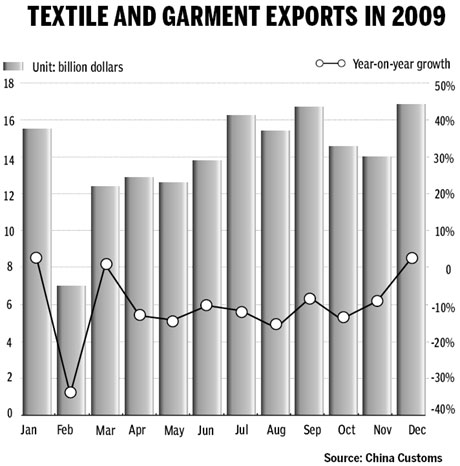Top Biz News
Textiles suffer turbulent year
By Wang Xin (China Daily)
Updated: 2010-03-10 09:55
 |
Large Medium Small |

Beijing - Usually high-flying foreign trade in the textile and garment industry had a bumpy year in 2009 as exports fell 10.1 percent to $167 billion, according to the statistics from China Customs.
Sun Huaibin, spokesman of the China National Textile and Apparel Council, blamed the decline on worldwide economic weakness as well as rising protectionism amid the global crisis.
He said protectionism is mainly reflected in more stringent technical standards and "abuse of anti-dumping and subsidy measures", as well as use of safeguard provisions on imports.
Last year more than 30 foreign investigations and preliminary rulings ranging from raw materials to finished products were made on China's textile exports.
"We have little control over the economic slump, yet we can do something in intellectual property to better protect our export-related textile businesses against protectionism," Sun noted.
Intellectual property is playing an increasingly important role in economic exchanges, especially with developed countries, he emphasized.
European Union countries, the United States and Japan are destinations of more than half the country's total textile and garment exports.
Domestic companies should increase awareness of respecting intellectual property and at the same time protect their own legitimate interest, Sun noted.
While some have begun to build brands, a great number of domestic clothes producers are still working as outsourced makers of other labels, known in the industry as original equipment manufacturing (OEM).
That is not necessarily a problem, he said, noting that the OEM business model offers opportunities to import advanced facilities and management experience while creating jobs.
Some Chinese proprietary clothes brands even have foreign subcontractors as their OEMs, marking significant progress in their brand building-up, Sun said.
A wild fluctuation from the beginning to end of 2009 saw textile exports increase 4.4 percent year-on-year to nearly $16.8 billion in December after a sharp fall in February.
With mounting orders from abroad slashed amid the global business slowdown last year, more export-oriented companies turned to the domestic market and joined in the already fierce competition.
Such heated competition triggered some substandard market behaviors like counterfeited products and patent infringements.
The council will step up campaigns for intellectual property protection, provide training on regulations and laws and publicize the names of infringing companies, Sun said.
"Now it is a common consensus among the industry that enhancing management and protection of intellectual property is of great significance to maintain the interests of rights holders and companies involved to upgrade businesses and ensure the healthy growth of the entire industry."
?













